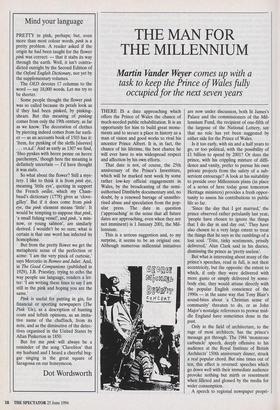Mind your language
PRETTY in pink, perhaps; but, even more than most colour words, pink is a pretty problem. A reader asked if the origin he had been taught for the flower pink was correct: — that it stabs its way through the earth. Well, it isn't contra- dicted outright by the Second Edition of the Oxford English Dictionary, nor yet by the supplementary volumes.
The OED devotes 17 columns to the word — say 18,000 words. Let me try to be shorter.
Some people thought the flower pink was so called because its petals look as if they had been pinked, by pinking- shears. But this meaning of pinking comes from only the 19th century, as far as we know. The decoration of clothes by piercing indeed comes from far earli- er — as an accounts book of 1503 has it: `Item, for pynking of the sleffs [sleeves] . . . vs.xd.' And as early as 1307 we find, 'Heo pynkes with heore penne on heore parchemyn,' though here the meaning is definitely uncertain — I'd have thought it was stabs.
So what about the flower? Still a mys- tery. I like to think it is from pink eye, meaning `little eye', quoting in support the French oeillet, which my Cham- baud's dictionary (1778) gives as 'clove- gilley'. But if it does come from pink eye, the pink element means 'little'. It would be tempting to suppose that pink, `a small fishing vessel', and pink, 'a min- now, or young salmon', are similarly derived. I wouldn't be so sure; what is certain is that one word has infected its homophone.
But from the pretty flower we get the metaphoric sense of the perfection or acme: 'I am the very pinck of curtesie,' says Mercutio in Romeo and Juliet. And, in The Good Companions (published in 1929), J.B. Priestley, trying to echo the way people use language, renders a let- ter: 'I am writing these lines to say I am still in the pink and hoping you are the same.'
Pink is useful for putting in gin, for financial or sporting newspapers (The Pink 'Un), as a description of hunting coats and leftish opinions, as an imita- tive name of the chaffinch, from its note, and as the diminutive of the detec- tives organised in the United States by Allan Pinkerton in 1850.
But for me pink will always be a reminder of the song 'Clavelitos' that my husband and I heard a cheerful beg- gar singing in the great square of Saragossa on our honeymoon.
Dot Wordsworth
































































 Previous page
Previous page